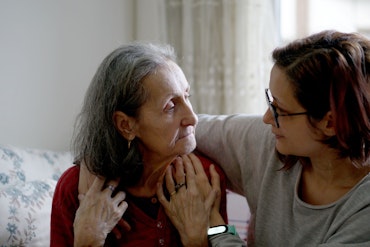Slow politics of dignity for aged and dying
Dignity is crucial to the proper operation of rights. If rights are to do what they are meant to do, they need to be deeply embedded in a country’s society and culture, writes Professor Gary Wickham.
It’s not enough just to have rights sitting on the books. The overwhelming majority of people in the country need to respect them at a personal level.
Without the dignity component, rights are hollow.
The contrast between rights with dignity and rights without is increasingly apparent with regard to two groups of Australians who are much in the news lately. These are those who have retired from the full-time workforce and those who are in the last stage of their lives – whether in their own homes or in some form of assisted-living accommodation.
The dignity aspect is present for most of those in the first group, which now contains a hefty percentage of the so-called baby boomer generation. Their rights to an adequate retirement income and access to necessary medical care are widely recognised and embraced by a great majority of the population. This extends to these matters increasingly at the centre of a vote-bidding war between the various political parties.
But there is precious little dignity for those in the second group. This already contains nearly all the parents of the first group and will soon contain its own older members as well. Anyone who has read Karen Hitchcock’s moving Quarterly Essay Dear Life: On Caring for the Elderly will know just how little dignity is available for Australia’s aged and dying.
The essay is a necessary spoiler for all members of our society: your life is unlikely to end as pleasantly as you hope it will.
Sure, the aged and dying have the right to assisted living care – whether at home or in special facility – and increasingly workable systems are in place to help them pay for it. But the dignity involved is usually very basic or non-existent.
When you reach this point in the cycle of life, especially if it’s not possible for you to remain in your own home, you should expect far less privacy and far less respect than you’ve been used to. You should expect that not all doctors will think you deserve the same attention and courtesy they show to younger patients.
In an aged-care facility you might have to spend large chunks of your time with people you’d rather avoid. While you’ll technically be free to leave whenever you want, in many such facilities you’ll have to get past locked doors and gates, locked “for your own well-being”.
Oh yes, did I mention that you won’t be the one who decides what constitutes “your own well-being”?
This is not to say that all aged-care homes are the same. As someone who’s had both parents die of Alzheimer’s disease, in different nursing homes, I’ve seen much bigger differences between facilities than I’d hoped would exist. This has forced on me a much greater appreciation of the importance of that difficult-to-define entity – an “ethos”.
This brings me to a final question about the dignity of the aged and dying (and I mean final in more than one sense). Should Australians who are reaching their dying time – including younger Australians who are dying from disease – be given the right to die as painlessly and peacefully as possible at a time of their own choosing?
This is the subject of increasing debate, as it should be, partly because we are faced with the prospect of much longer lives than was the case for those who lived entirely in the 20th century and partly because other similar countries have already taken significant steps down this path.
I can’t say I’ve come to a firm yes or no on the question. I feel confident a reliable system of regularly renewed consent can be adopted and adapted from the countries that have implemented one. Nonetheless, I have a lingering concern that a right to die for all who want it might become an expectation for some who don’t.
If it is truly only the dignity element that gives a right its full force, then I wonder whether important rights for the aged and the dying – like the right to choose how to live out one’s final years and the right to receive in these years the same attitude from carers and health professionals one receives in earlier years – will mean what they should mean only if the option of choosing a dignified death is available to all dying Australians.
Gary Wickham is Emeritus Professor of Sociology at Murdoch University.























